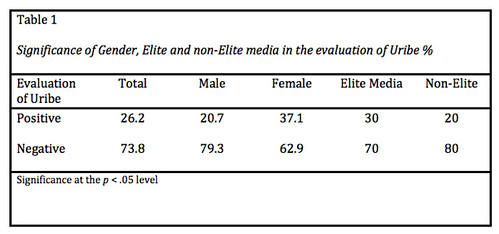By Víctor García
When talking about politics, the 100 most relevant Colombian journalists with the most followers on Twitter openly share their opinions and are increasingly likely to include links that lead readers to websites other than their own. The findings were announced in a study presented by the University of Texas in Austin at the recent annual conference of the Association for Education in Journalism and Mass Media (AEJMC) in Montreal.
Through an analysis of Twitter content, the study found that journalists parted from their neutral position to share their political opinions (81.7%) when they mentioned former President Álvaro Uribe (2002-2010) in their tweets, known as “trinos.” Three out of every four tweets from journalists that mention Uribe express a negative attitude towards his participation in politics (73.8%). Only 25 percent of the tweets contained simple facts and hard data and 12 percent expressed humor or satire.
The kind of publications that the journalists worked for was significant in this case. Reporters who worked for traditional organizations, belonging to the journalistic elite, expressed fewer opinions on Uribe (78.6%) than their colleagues who worked for less traditional organizations, such as publications that originated online (86.7%).
In their tweets, journalists also established a relationship between Uribe and the peace process that has been held between the Juan Manuel Santos government and the FARC guerrillas in Havana, Cuba. Of the tweets that were analyzed, 12 percent related Uribe with the peace process, and of those messages 90.6 percent expressed a negative tone with respect to Uribe’s influence in the negotiations.
Reporters viewed his activities as harmful to politics and to the peace process between the government and the FARC guerillas.
In order to identify the opinions of these journalists towards Uribe, this project followed and collected the tweets from the accounts of each of 100 journalists between Sept. 1 and Dec. 1, 2013. A total of 1,523 tweets were collected.

Four notable events occurred during the selected sample time: 1. Former President Uribe announced his return to politics to run for office as a senator, 2. Oscar Iván Zuluaga was elected by Uribe’s new political party as its presidential candidate for 2014, 3. In peace negotiations in Havana, the Colombian government reached an agreement with the FARC guerillas regarding their political participation, and 4. President Santos announced that he would seek reelection.
On the other hand, Colombian journalist seem to have grasped the dynamics of social networks, openly sharing content and external links that are useful to their readers, even if these links take them to pages outside the web space of their own media companies.
An estimated 38.5 percent of tweets from the journalists contained links. From these messages with links, 57.6 percent of the links directed readers to pages outside of the media that the journalists publishing the information worked for.
As a consequence, the journalists appear to see Twitter not only as a platform to distribute their own content but that they have partially opened their doors to other media and informational resources that would benefit the users in their network. Even so, journalists do still prefer to publish original messages on Twitter and they have some difficulty responding to or replicating the content of other users.
In terms of transparency, few journalists share information about the news generation process (15.1%) or personal information (7.8%) in their tweets. Nevertheless, in this case, more research is necessary to analyze the interaction of journalists in contexts other than the political coverage of former President Álvaro Uribe. The stickiness of politics could condition the openness of reporters when it comes to sharing things related to their work or family.
The final goal of this study was to show how journalists adopt new practices in the online world and how they part in some ways from professional traditions in areas such as objectivity, gatekeeping, and transparency.
Note from the editor: This story was originally published by the Knight Center’s blog Journalism in the Americas, the predecessor of LatAm Journalism Review.